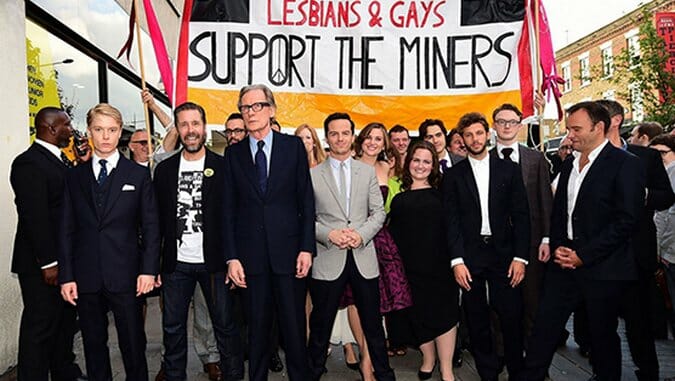Pride

From its first frames, Pride opens itself wide to scrutiny: this is based on a true story. We’re used to this, of course. We turn to the cinema for escape, but by invoking REALITY the so-called “true story” breaks the illusion we’ve sought, and in turn, we feel it’s our obligation to call the veracity of every single element on the screen into question. Heartfelt speechifying, noble human gestures, lifelong struggles against adversity: when a film purporting to be true douses these idealistic pursuits in a sheen of Hollywood glitter, it’s hard to take that film seriously—let alone not resent it. Two hours of being willfully manipulated hardly sounds like a good time at the multiplex.
Which makes Pride kind of remarkable, because unlike so many other attempts to translate honest-to-goodness life to celluloid, it refuses to take itself too seriously. Admittedly, this attitude may raise red flags for viewers who like their social dramas staid and dour, their historical accounts straightforward. How can a work of historical fiction respect its own history when it’s practically littered with wacky comic beats and a one off dance sequence? Where does such a film draw a line between funny business and gravitas?
For Matthew Warchus, neither of these questions is rhetorical. He takes us back to 1984, the year that marked the beginning of the UK miners’ strike (and for those not up on that event’s particulars, Pride does its homework so you don’t have to). As Maggie Thatcher commences her campaign to shut down coal mines across the region, a group of young gay activists (officially labeled as Lesbians and Gays Support the Miners) rally together to support the miner unions at the urging of one Mark Ashford (Ben Schnetzer, in an eye-catching turn). Ashford sees a kinship between his cohorts (including Dominic West, Andrew Scott, and Faye Marsay) and the beleaguered miners, noting their similar treatment at the hands of the nation’s police. When one character points out that the miners have never even feigned having a stake in homosexual interests, Ashford simply retorts, “It’s the right thing to do.”
The trouble, of course, is that nobody in England in 1984 wants to associate with the gays, so Ashford and his troupe reach out to the Welsh town of Onllwyn (pronounced “on-thleen”) instead. It’s a clever ploy: the gang identify themselves through initials only, and so the townsfolk (chiefly led by an excellent supporting cast comprised of a genial Paddy Considine, a doleful Bill Nighy, and a fiery Imelda Staunton, a trio who pretty much have every movie to ever emerge from the U.K. covered) graciously accept the proffered assistance. When “L.G.S.M.” and Onllwyn’s populace finally meet, Pride becomes a rather hysterical culture clash picture, where, for example, elderly women ask the group’s “L” component whether it’s true that all lesbians are vegetarians.
-

-

-

-

-

-

-

-

-

-

-

-

-

-

-

-

-

-

-

-

-

-

-

-

-

-

-

-

-

-

-

-

-

-

-

-

-

-

-

-








































